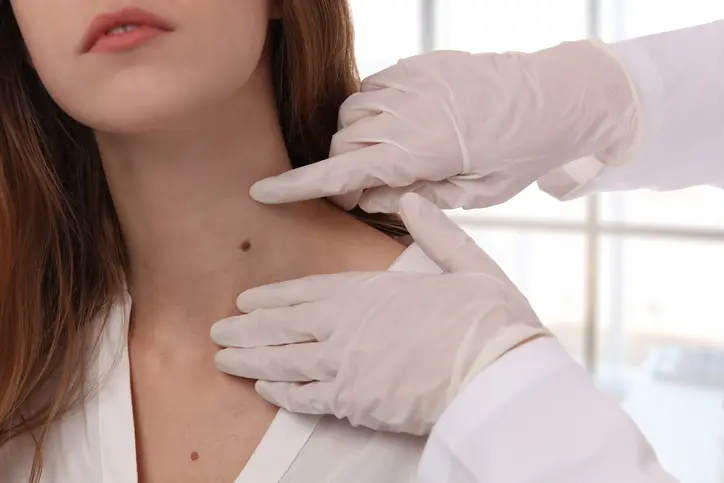Moles & Warts in West Palm Beach, FL
Moles and warts affect your appearance. Additionally, moles may increase your risk of developing melanoma. Whether for appearance or health concerns, the board-certified dermatologists at Dermatology Associates of the Palm Beaches, with locations in Palm Beach Gardens, West Palm Beach, Atlantis, Wellington, Delray Beach, and Trinity, Florida, can diagnose and treat your moles and warts, call or click here to book an appointment online.

What are moles and warts?
Moles and warts are types of skin growths. Though both affect appearance, they’re not the same thing.
Moles
Moles, also called nevi, are skin growths that develop when your pigment cells or melanocytes grow in clusters. Most adults have 10-40 common moles, which are moles that are generally no wider than the width of a pencil eraser.
Your common moles are round or oval, have a smooth surface with a distinct edge, and are uniform in color.
Warts
Warts are small skin growths caused by the human papillomavirus (HPV). These skin growths may be disfiguring and embarrassing, and they may itch or hurt, especially if they develop on your feet.
Types of warts treated at Dermatology Associates of the Palm Beaches include:
- Common warts (appear on the hands)
- Flat warts (occur on the face and forehead)
- Genital warts (found on the genitals)
- Plantar warts (found on the soles of the feet)
- Subungual and periungual warts (develop around toenails or fingernails)
All warts spread from one part of your body to another, as well as from person to person. A typical wart is raised or oval with a rough surface.
Patient Reviews
“Dr. Brown is thorough and professional. She provides good educational information. I’m happy to see her mentoring a new MD. We all need good teachers!” – Belinda S.
When should I be concerned about my moles?
Common moles aren’t cancerous. However, if you have 50 or more common moles, you’re at a greater risk of developing melanoma, the deadliest form of skin cancer. You should contact Dermatology Associates of the Palm Beaches for a skin cancer evaluation if you develop moles that:
- Change in color, shape, or height
- Get smaller or larger
- Grow unevenly
- Develop a dry or scaly surface
- Itch
- Bleed or ooze
You should also be concerned about existing moles if they develop any of these characteristics. Dermatology Associates of the Palm Beaches specializes in the diagnosis and treatment of skin cancer and can provide the expert care you need.
How are moles treated?
In most cases, moles don’t require treatment. However, your provider at Dermatology Associates of the Palm Beaches may discuss your treatment options if your mole is bothersome or unattractive.
They also treat moles that may be cancerous lesions, offering many options for removal after confirming skin cancer with a biopsy. As an example, the fellowship-trained Mohs surgeons remove cancerous lesions one layer at a time to minimize damage to the surrounding healthy tissue.
How are warts treated?
Dermatology Associates of the Palm Beaches recommends you seek professional help for wart removal. At-home treatments may lead to cosmetic disfigurement or cause the skin growths to spread.
Wart removal options may include:
- Cantharidin (causes the skin under the wart to blister)
- Cryotherapy
- Excision
- Laser treatment
Your provider reviews your wart removal options and determines the best method for you based on wart type and severity.
To discuss treatment options for moles and warts, call Dermatology Associates of the Palm Beaches or click here to book an appointment online.
